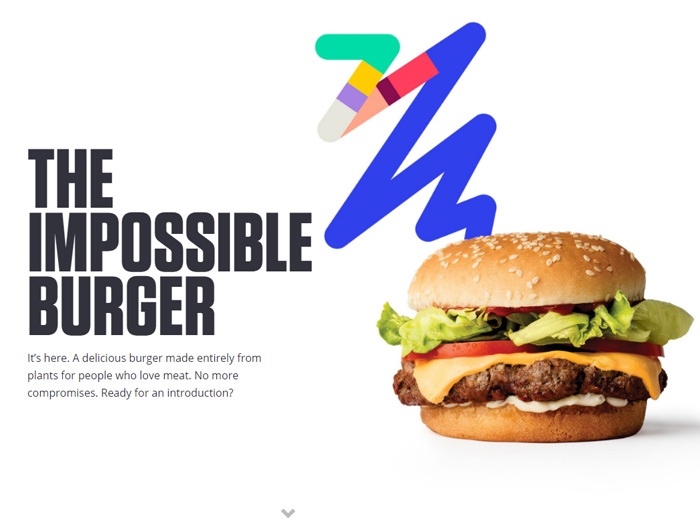Impossible Foods Launches Co-manufacturing Collaboration With OSI
August 2, 2019 | 7 min to read

REDWOOD CITY, Calif.– Impossible Foods launched a co-manufacturing collaboration today with global food provider OSI Group, one of the largest food producers in the world.
OSI will begin producing Impossible Foods’ flagship product, the Impossible Burger, starting next month, adding short-term capacity to Impossible Foods’ plant in Oakland, Calif. OSI will continue to expand production of Impossible Foods’ flagship product throughout 2019 and thereafter.
“We conducted an exhaustive due diligence process to determine how to scale our manufacturing, both in the short term and over the next several years, and we were thoroughly impressed with OSI’s commitment to quality and responsiveness,” said Senior Vice President of Product and Operations Sheetal Shah, who joined Impossible Foods in May and oversees numerous functions including manufacturing, supply chain and logistics. “OSI has already installed equipment to make the Impossible Burger, and we’ll start seeing new capacity every week.”
OSI can source, develop, produce and distribute custom food solutions worldwide. The privately held company based in Aurora, Ill., has more than 65 facilities in 17 countries.
“We look forward to lending our expertise to Impossible Foods as it embarks on one of the most ambitious startups in the food industry,” said Kevin Scott, Senior Executive Vice President, OSI North America. “At the same time, Impossible Foods will help fulfill the OSI Group’s commitment to sustainable food production — one of the core prisms through which OSI management makes operational decisions.”
Scorching demand
The co-manufacturing deal comes amid unprecedented demand for the company’s flagship product, the plant-based Impossible Burger, which debuted at Chef David Chang’s Momofuku Nishi and other world-class restaurants in 2016.
At the International Consumer Electronics Show in January 2019, Impossible Foods launched the award-winning and “shockingly good” Impossible Burger 2.0 — the company’s first significant product upgrade. The Impossible Burger, the first food ever featured at CES’ roster of game-changing technologies, won the show’s top prizes.
Since the launch of the 2.0 version six months ago, Impossible Foods’ sales have surged. Growth has come from every sales category in which the company does business — independent restaurants, large restaurant chains such as White Castle, Cheesecake Factory and Qdoba, and non-commercial outlets such as theme parks, museums, stadiums, and college campuses. The Impossible Burger is now on menus in about 10,000 restaurants on two continents.
In many restaurants, the Impossible Burger is a top-selling item and a key driver of new foot traffic. In addition to an increasing number of restaurants that sell the Impossible Burger, chefs are expanding the number of items made from the versatile plant-based meat, with average per-store volume increasing.
In April, the world’s second largest burger chain, Burger King, debuted the Impossible Whopper in a regional test in St. Louis. The 59-unit regional test of the Impossible Whopper at Burger King restaurants in St. Louis has gone exceedingly well; the Miami-based restaurant chain intends to bring the Impossible Whopper to all 7,200 U.S. restaurants.
Since launching in Singapore in March 2019, sales have more than quadrupled in Asia. Impossible Foods’ plant-based meat is sold in a wide range of restaurants and cuisines throughout Hong Kong, Singapore, and Macau — including internationally celebrated establishments by David Myers, Gordon Ramsay and Wolfgang Puck.
Impossible Foods plans to launch the Impossible Burger in retail outlets later this year.
Designed to disrupt, built to scale
Founded in 2011 by Stanford biochemistry professor and former pediatrician Dr. Patrick O. Brown, Impossible Foods makes meat sustainably, from plants. The company uses modern science and technology to create wholesome food, restore natural ecosystems, and feed a growing population sustainably.
Impossible Foods has tripled the weekly production rate and has doubled headcount hired at its plant in Oakland, Calif., since March 2019. The 68,000-square-foot plant produced an all-time record volume of product in May 2019, then another record amount of product in June 2019, thanks to increased staffing and operational efficiency improvements.
In March, Impossible Foods hired Dennis Woodside as President, overseeing the company’s rapid scaleup. Woodside, who has nearly 25 years of professional experience at both startups and publicly traded multinationals, previously served as Chief Operating Officer of Dropbox, where he was responsible for all customer-facing functions and revenue generation. Before that, Woodside was Chief Executive Officer of Motorola Mobility, a $10 billion mobile device company, after its acquisition by Google. He worked at Google from 2003-2012, overseeing more than $10 billion in sales in North and South America, Europe, the Middle East and Africa, among other leadership roles.
In May, Impossible hired tech industry scaleup veteran Shah, who was previously Chief Operations Officer at Verifone. Before that, Shah served as Chief Procurement Officer and numerous leadership roles at Motorola Mobility, a $10 billion mobile device company acquired by Google.
Also in May, Impossible Foods announced a $300 million funding round. Led by existing investors Temasek and Horizons Ventures, the “Series E” round will be used to accelerate the company’s rapid scaleup — including accelerated hiring and capacity expansion at the company’s plant in Oakland, Calif. Since its founding in 2011, the industry-leading food-tech startup has raised more than $750 million.
About Impossible Foods:
Based in California’s Silicon Valley, Impossible Foods makes delicious, nutritious meat and dairy products from plants — with a much smaller environmental footprint than meat from animals. The privately held company was founded in 2011 by Patrick O. Brown, M.D., Ph.D., Professor Emeritus of Biochemistry at Stanford University and a former Howard Hughes Medical Institute investigator. Investors include Khosla Ventures, Bill Gates, Google Ventures, Horizons Ventures, UBS, Viking Global Investors, Temasek, Sailing Capital, and Open Philanthropy Project.
About OSI
OSI Group, LLC is a 100-plus year old, privately held corporation that is a global leader in supplying value-added protein items and other food products to leading foodservice and retail brands. The company currently has more than 65 facilities in 17 countries, with its global headquarters located in Aurora, Illinois, a suburb of Chicago.
